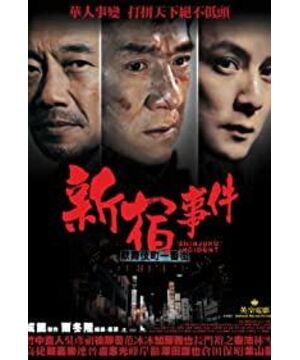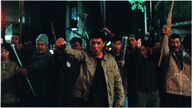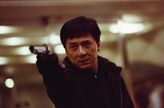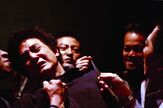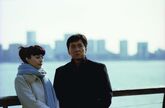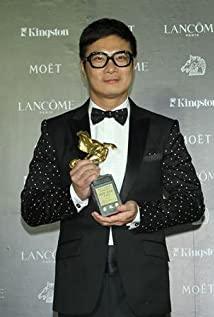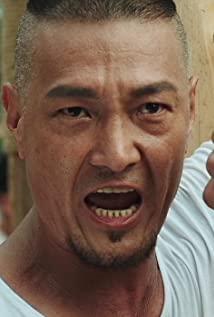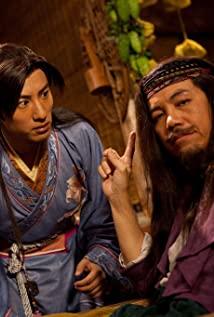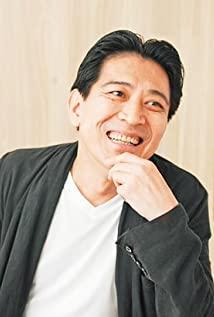Teacher Shu Qi said that "Shinjuku Incident" made him have the urge to leave his seat. Ask yourself, it is not enough for an ordinary audience like me - what really makes me have the urge to leave and shake my head is "Night and Fog in Tianshui Wai" ".
"Shinjuku Incident" maintains the consistent level of Er Dongsheng, and continues to grow along with "Mong Kok Night" and "Disciple". It is said that it is an epoch-making classic, how come there are so many epoch-making appearances of Hong Kong films in recent years? To say that it is very unreliable, but also to see it with relish. Therefore, for its final evaluation, you can refer to the star distribution of "Mong Kok Night" and "Disciple", which is probably like that.
Three months from now, this page will be occupied by spoofed comments, and "Shinjuku Incident" is definitely the kind of film that can be written particularly funny and not serious. Wu Yanzu, Lin Xue's group, Fan Bingbing and Xu Jinglei, as well as Takenaka Naoto and Gao Jie, each point is particularly "engaged". If you are interested, the northeast section and driving a tractor can probably talk and laugh.
============The text part (involves a small amount of plot, which may affect viewing) =========== For the
graphic version, see Netease http://ent.163.com /09/0408/09/56C96EKF00031NJO.html
Looking back on Er Dongsheng's directing career, he is outstanding in the field of emotional dramas and has received numerous praises. Until the beginning of the new century, he entered the field of gang films under the background of the sluggish Hong Kong film. The shooting of "Shinjuku Incident" this time is a rare major production and highlight of Hong Kong films in recent years. With more stars coming together, more dangerous foreign countries, more hot and brutal violent conflicts, Er Dongsheng obviously wants to further expand on the basis of "Mong Kok Night" and "Disciple".
Since the filming began, the film has been in constant news. Under the bombardment of headlines such as "Jackie Chan floating in Tokyo Bay", the much-anticipated "Shinjuku Incident" has become an unexploded mine. The author watched the Grade III version at the Hong Kong International Film Festival, and the version that is currently showing in Hong Kong cinemas is the Grade IIB version. In contrast, there may be a few changes to the lens, but it is almost negligible. The following text takes the Level III version as the final basis.
Love and Righteousness
Tietou (Jackie Chan) smuggled into Japan, and his identity is not visible, so he can only take refuge in Ajie (Daniel Wu) who is already in Shinjuku. A group of people work underworld jobs just for a living, and it seems that they have nothing to pursue. When there was no hope of saving his love, he decided to let go and do something.
The brothers who came out to hang out are worth thousands of dollars. There is love and righteousness. Isn't it the same thing as love and righteousness, but analyzing the "love and righteousness" in "Shinjuku Incident", they can be viewed separately. Unlike other people who dream of making a fortune or want to hit the big luck, Iron Head's purpose of crossing the ocean seems more noble - he wants to find the woman he loves. What a pure ideal, there seems to be a natural infatuation factor in the character setting of Iron Head, which cannot be eliminated once it occurs.
It sounds that Er Dongsheng wants to make love so emotional and emotional, but this is a gang movie, love is just a flower and bone flower, and his emotions are handled routinely. The restrained Xiuxiu and the lively Lili, two women with completely opposite personalities, are too similar to Tietou's painful choice of being involved in black and whitewashing. The final ending returned to the original beginning, and this search for love directly brought Tietou to a dead end. However, if you want to impress the audience with this, you can only say sorry.
Tietou's renunciation of love and righteousness brought Lili a slap in the face. In comparison, the film's performance in righteousness is even more indescribable. The Chinese gang plays a big part in the film. Although there are many characters around Tietou, they are more reckless and timid, and there are few people who are brave and good at fighting. In the middle, when they were united as one, it was more like the hard work of one person in exchange for the extravagance of everyone. There is a lack of guys around Tietou who can really fight alongside him, and no one pays any attention to his philosophy. The only positive old ghost was just a peacemaker, and he didn't want to die worse than anyone else.
Iron head driving a tractor and Ajie who wants to sell chestnuts, there is no essential difference between slowly entering the water and being dragged into the water. This is hard, fortitude and cowardly, and it is nothing more than a one-sided character. From this point of view, "Shinjuku Incident" is a "ruthless" film, the love did not end well, and the brotherhood was even more dead.
Black and White
In the 1990s, Takashi Miike took Kabukicho, Shinjuku as the background, and successively filmed a number of Yakuza works (Yakuza, the name for gang members in Japanese), including the later more "notorious" "Killer" one". The first part of Miike's underworld trilogy is called "Shinjuku Underworld", which shows that Shinjuku is a must for Japanese gangsters.
Cooperation and confrontation, the interests of the three gangs come first, you can find some shadows in "Young and Dangerous Boys". However, the gang struggle in a foreign country is more likely to remind people of Kitano Takeshi's "Big Brother". The Japanese gang broke into the United States, ushered in the competition of different gang forces, and finally lost to the more powerful Mafia. There are bloody and violent scenes in the film, and there is no turning back for the protagonist.
Er Dongsheng's gang films always have a contrast between black and white, and "Shinjuku Incident" is no exception. The criminal policemen Kitano and Tietou met unexpectedly and did not want to owe a favor. Although black and white are different, Kitano is the No. 1 character who is very close to Tietou. Naoto Takenaka once spoke the Shanghai dialect that no one could understand in "Japanese Underworld". This time, he had more opportunities to express his language skills, and he was very good along the way.
Tietou belongs to the type of people who take it as soon as he sees it. It's just that people are separated from each other, and his brother doesn't buy it. He unknowingly stood on the opposite side of his brother, leading to a climax of the fight. From being hacked at the beginning to trying hard to clean up, and finally being dragged back by the black hand, it is more important for Tietou to choose his brother than to accept the arrangement of fate reluctantly.
Looking back at Tietou's fortune and inner transformation, the film uses two assassinations and driving a tractor to hurriedly explain. The easy assassination is really different from the audience's established assumptions. After he took over the site of the Tainan Gang, he let it go, and made a deal with it in terms of time, which led to the cooperation between Tietou and Beiye, and the outbreak of conflicts became quite abrupt. Pacing back and forth in black and white, the iron head changing back and forth is exactly what his sorrow is.
Blood and night
do not have Jackie Chan's fists and feet. The focus of "Shinjuku Incident" is violence. It uses brutal violence to reveal the difficulties of Chinese living at the bottom of Shinjuku, and the focus continues unabated. The action scenes of the film are compressed to a small number. Even Jackie Chan, until the climax, has only one cut, one stab and one shot, which adds up to less than a minute. As a remedy, there are many astonishing flashes of blood in the film, and the violence often comes very suddenly, and the level of exposure is terrifying. The chestnut youth's dream was destroyed, the Tainan boss was self-sufficient, and the Aberdeen counterattacked. Several key scenes were handled extremely bloody.
In the climax of the rush, the Watanabe Group joined the Tainan Gang to carry out a night attack in order to eliminate Eguchi and the Chinese Gang. Er Dongsheng did not blindly use grand pomp and crowd to create a tense and tragic atmosphere. The process progressed very slowly, and several ups and downs firmly captured the hearts of the audience. The signal of the attack was not gunshots or knives, but a rock breaking through a window. The subsequent stance of the rock formation was a highlight. Many thugs directly climbed the wall and climbed the windows, just like the siege mode of a modern city. On the side of the iron gate, the Tainan Gang demolished it desperately, and the Chinese Gang was unable to defend against the enemy, and the corridors were defeated in hand-to-hand combat. The lights suddenly went out and the fighting stopped.
Er Dongsheng's handling was obviously influenced by professional customer Du Qifeng. Unfortunately, the tension was slightly insufficient. After a brief period of calm, the scene soon fell into chaos. It should be said that Du Qifeng focuses on freehand lyricism in confined spaces, and Er Dongsheng wants to add freehand content to the realistic fight. The idea is good, but the effect presented is mediocre. You can feel that the director has the intention to try some changes, but he only feels that he wants to do well in every aspect.
Tietou, who was lucky enough to escape, got into the trap set by others again. He ran wildly, thinking that he could save something but never thought about the situation on Xiuxiu's side. Tietou came for this woman, and finally left because of her. He saved Kitano's life in the sewers, and the other party could only watch him sink into the water and disappear. The circle in the form of this screenwriter undoubtedly has the element of destiny. The dissatisfied Eguchi and the adequate Tietou have not escaped the tricks of life.
Gains and Losses The
Chinese Gang went from being a mess to occupying the territory. It was powerful for a while but could not escape being destroyed. Shinjuku not only has local head snakes, but also a mix of various people and official forces. Chinese gangs have good beginnings and no good ends. The problem is not the inferior roots of Chinese infighting or the limitations of farmers' vision. The inevitable failure can be simply attributed to the phrase "a strong dragon cannot overwhelm the local snake." What's more, this is Jackie Chan, who has lost his signature fight. His ordinary face has long been far away from the image that he can't be beaten to death.
Jackie Chan's performance this time has a tendency to go deeper, but it is still not enough to shape the character of Tietou. His love and his choices are often untenable. It seems that it is difficult for people to admire or even complicated love-hate intertwining. .
Tietou's concept is not new, and "sooner or later you will have to pay back when you come out" is not even a sense of consciousness. So "Shinjuku Incident" is repeating the old tradition of cornering? It can be said that Er Dongsheng focused his attention on exposing the ills of the Chinese community, such as the old overseas Chinese played by Qin Pei, a snob who sees the wind. Then there is the continuously depraved and unreal Applejack, his escape and Aberdeen's face-turning are two extremes. It can also be said that the flashback at the end reappears the good times when a group of people shared weal and woe, and the years of friendship that they shared are worth remembering but not on the stage.
The merit of "Shinjuku Incident" worth pointing out is that the supporting cast is shining brightly, which can somewhat restore some of the shortcomings of "Jackie Chan doesn't fight". Whether it is the role credit or the acting skills, Wu Yanzu, Gao Jie, and the above-mentioned Takenaka Naoto have performed well. The completely different interpretation methods of Xu Jinglei and Fan Bingbing will also cause controversy and comparison.
Er Dongsheng, who has always been level and stable, has the plot points buried just right, and the ups and downs are consistent. No matter what the real starting point is, the story is full of tension, with some familiar shadows of golden age Hong Kong films.
For two hours, it looked like a storm, a burst of violence. Just waiting for the rain to pass and the sky is clear, it will feel like it is just ordinary.
View more about Shinjuku Incident reviews


